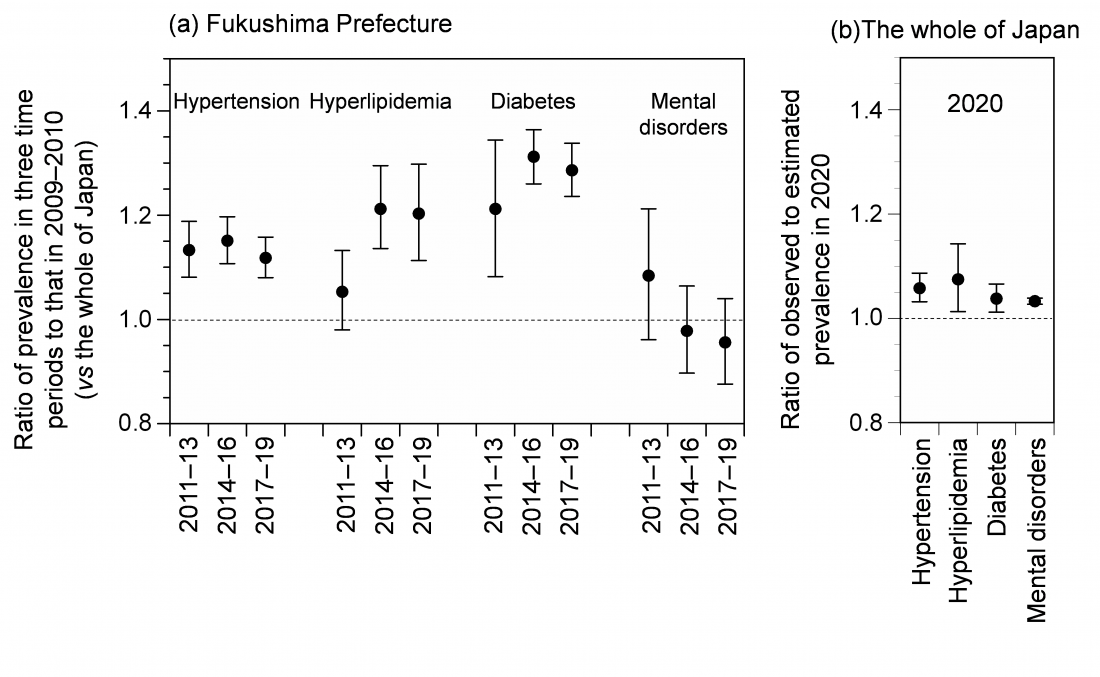Fig.
(a) Change in prevalence of diseases after the Fukushima disaster (Fukushima Prefecture); (b) Change in prevalence of diseases after the COVID-19 outbreak (the whole of Japan). Error bars represent 95% uncertainty intervals.
Researchers from Osaka University showed an increase in major non-communicable diseases after the Fukushima disaster and COVID-19 outbreak
Osaka, Japan - Disasters and pandemics can affect the physical and psychological health of the people involved even after the events have occurred. These effects can include non-communicable chronic diseases. Now, researchers at Osaka University have identified the similarities and differences in secondary health effects in people who have experienced disasters and pandemics.
After the devastating Great East Japan Earthquake and the Fukushima Daiichi Nuclear Power Station accident in Japan in 2011, non-communicable diseases have increased since that time. In a seven-year follow-up after the Fukushima disaster, a previous study revealed the age-adjusted prevalence of diabetes in both evacuees and non-evacuees significantly increased. Similar concerns existed regarding the COVID-19 pandemic and its potential impact on chronic illnesses. This meant many restrictions were implemented to ensure the safety and health of the people of Japan. To stop the spread of infection, people were encouraged to stay at home and work from home. Perhaps as a result of this, increased body weight among certain populations and mental disorders were observed.
In this study, the changes in the prevalence of diseases in Japan, including hypertension, hyperlipidemia, diabetes, and mental disorders, before and after the Fukushima disaster and the COVID-19 pandemic were reviewed using a health insurance dataset over a long period of time. First, the changes in the prevalence of hypertension, hyperlipidemia, diabetes, and mental disorders over nine years following the Fukushima disaster were analyzed. Second, the changes in prevalence before and after the COVID-19 pandemic were examined. Results were examined by age and sex to determine the most significantly affected groups.
Results of this study showed that the prevalence of all four diseases increased in Fukushima Prefecture after the Fukushima disaster and in the whole of Japan after the COVID-19 outbreak as well. The increased rates of hypertension, hyperlipidemia, diabetes, and mental disorders were higher in females aged 40-74 years after the Fukushima disaster. However, after the COVID-19 outbreak, the increase in prevalence rates of all four diseases was higher among males aged 0-39 years.
“This study has shed some light on identifying the vulnerable populations involved and assessing the secondary effect of disasters on the mental and physical health of these people” says lead author, Michio Murakami.
The importance of supporting secondary health effects after disasters and pandemics are now being recognized and can lead to improved post-disaster policies and recommendations that focus on health promotion and effective prevention strategies.
###
The article, “Annual prevalence of non-communicable diseases and identification of vulnerable populations following the Fukushima disaster and COVID-19 pandemic,” was published in the International Journal of Disaster Risk Reduction at DOI: https://doi.org/10.1016/j.ijdrr.2022.103471
About Osaka University
Osaka University was founded in 1931 as one of the seven imperial universities of Japan and is now one of Japan's leading comprehensive universities with a broad disciplinary spectrum. This strength is coupled with a singular drive for innovation that extends throughout the scientific process, from fundamental research to the creation of applied technology with positive economic impacts. Its commitment to innovation has been recognized in Japan and around the world, being named Japan's most innovative university in 2015 (Reuters 2015 Top 100) and one of the most innovative institutions in the world in 2017 (Innovative Universities and the Nature Index Innovation 2017). Now, Osaka University is leveraging its role as a Designated National University Corporation selected by the Ministry of Education, Culture, Sports, Science and Technology to contribute to innovation for human welfare, sustainable development of society, and social transformation.
Website: https://resou.osaka-u.ac.jp/en



